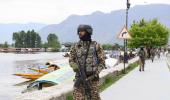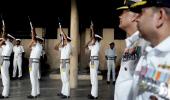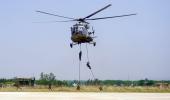'Diplomatic and economic responses are first announced and then implemented. A military response is announced only after it is done.'

"In 2016, they killed 19 of our soldiers in Uri. In response, we launched a shallow strike."
"In 2019, they killed 40 CRPF personnel in Pulwama and we launched air strikes deep inside Pakistan."
"This time, they have killed tourists from all over India and PM Modi has announced that we will hunt them till the end of the earth," says former Lieutenant General Satish Dua, former commander of 15 Corps in Kashmir.
Lt Gen Dua was among the top officers to plan and coordinate the surgical strikes in September 2016.
A leading commentator and writer on military affairs, he spoke to Rediff's Archana Masih on India's response to the dastardly terrorist attack on innocent tourists in Pahalgam.
As a former commander who oversaw the surgical strikes in 2016, what are the military options for India after the Pahalgam terror attack on innocent tourists?
The response doesn't have to only be military.
It has to be diplomatic, economic and military.
The diplomatic response started soon after the attack by the suspension of the Indus Water Treaty with Pakistan. It is the harshest measure taken by India which will impact the whole country of Pakistan.
We did not do this even during the four wars with Pakistan and never used water as leverage.
It is a big step.
Other measures we have taken are the cancellation of visas and withdrawal of diplomatic staff.
India did not have economic ties with Pakistan as such, barring supply of medicines as part of humanitarian efforts. However, the Indus water suspension will hurt them economically.
It will be the biggest economic issue for Pakistan because the farmers of Pakistan are dependent on these waters. They will starve if India uses water as leverage.

What about the military response?
In 2016, they killed 19 of our soldiers in Uri. In response, we launched a shallow strike.
In 2019, they killed 40 CRPF personnel in Pulwama and we launched air strikes deep inside Pakistan.
This time, they have killed tourists from across India and told the women survivors to 'Go tell Modi.'
The prime minister cut short his visit to Saudi Arabia and announced the harshest measure of suspending the Indus Water Treaty.
He also announced clearly in a public meeting in Bihar that India will identify, trace and punish every terrorist and their backers, and hunt them till the end of the earth.
In a speech given in Hindi, he switched to English just to say these three lines. Why? Because the PM wanted to send a global message.
Both PM and Defence Minister Rajnath Singh have said that they will go after the terrorists and the ecosystem of terrorism against Pakistan.
So India's response will be big. What shape it will take is something we cannot discuss.
One must remember that the diplomatic and economic response are first announced and then implemented. The military response will only be announced after it is done.
And it will be a different response than what we have done in the recent past like surgical strikes?
Our response will be different this time.

Terror attacks had increased in Jammu region while there was improvement in the security situation in the Valley. Did we get lulled into thinking that normalcy had returned to Kashmir?
The security grid is in place in the Valley. Every inch of every valley, every lake, every hill, every garden, every tourist attraction cannot be guarded. It is wrong to even expect security to be posted at every tourist attraction.
Terrorists have taken a leaf out of the Hamas playbook like what they did at the music festival in Israel.
Pakistan is learning from Hamas and that is why Hamas leaders visited Pakistan several times recently.
They have never attacked tourists because it takes away the livelihood of the local population.
In doing so, they have antognised people. Politicians and people across parties have come out in solidarity with the deceased. There have been candle marches across the Valley condemning the act of terror.
People of Kashmir are saying enough to terrorism.

The situation had improved so much in Kashmir. Tourists were coming for the summer, restaurants, cafes, movie theatres had opened...
Pakistan wants to spoil all that. That is what they want. Striking south of Pir Panjal in the Jammu, Kathua, Kishtwar region is not the heart of Kashmir.
They want to strike at the heart of Kashmir to capture global attention.
How difficult is it to get human intelligence from the ground in Kashmir?
We cultivate our sources, but now is the time to capitalise on the local detestation for the terrorists and build human int.
How has security deployment changed after the abrogation of Article 370 in 2019? Has it been reduced, making the Valley vulnerable?
Deployment in counter terrorism is always dynamic. It changes as per requirement and the presence of terrorists. Troop deployment is also dynamic, it goes along with the threat and goes up and down in accordance with the level of threat.

As a former commander, what would your message be for Kashmiris and the people of India at this time?
Kashmiris can clearly see that terrorists don't care about their livelihoods. Locals had bought cars to be used as taxis, invested in home stays, and all that has come to a standstill.
Without popular support, no terrorism can survive. Kashmiri people should not fall prey to a few rabid people.
And the rest of India should not use this to spread hate against Muslims.
If we do this then the terrorists would have achieved what they set out to do, and we must stop this.
There are examples of a Muslim pony wallah who lost his life saving people, and others who rescued several tourists.
Feature Presentation: Aslam Hunani/Rediff.com










